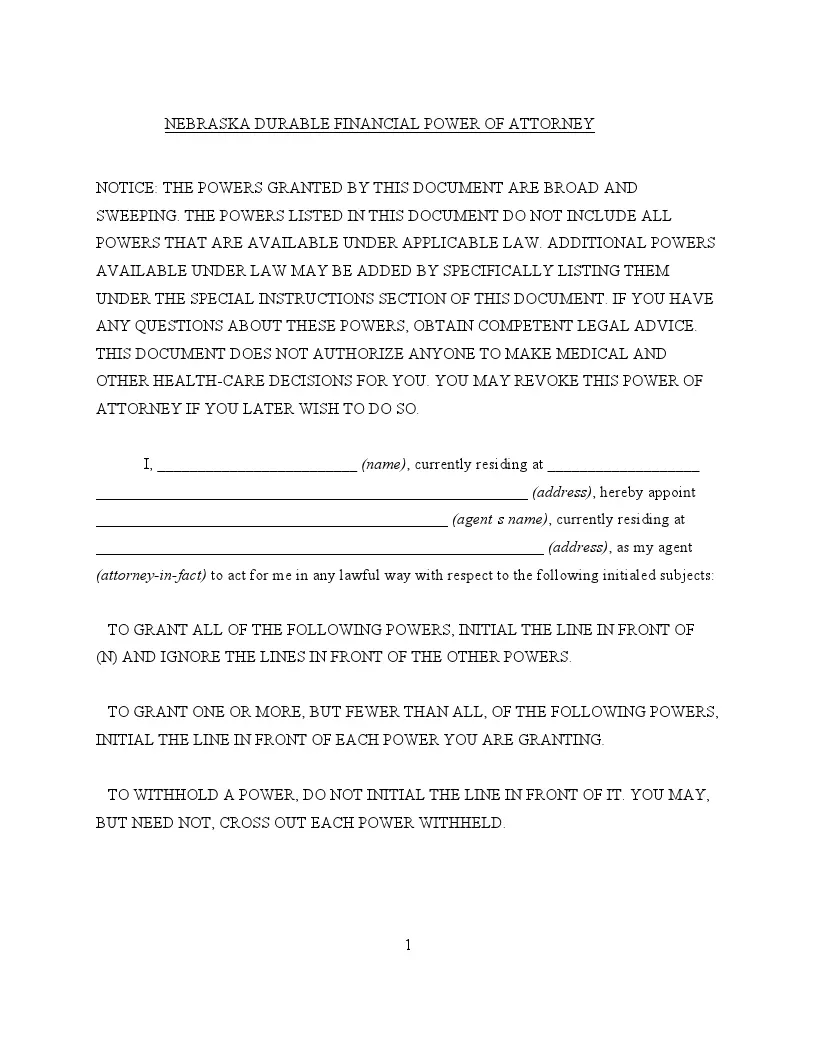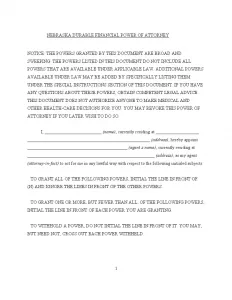Free Nebraska Durable Power of Attorney Form
The Nebraska durable power of attorney is a formal document that enables a person to designate someone else to oversee their financial matters and make decisions for them. The term “durable” indicates that the agent’s power persists even if the principal is incapacitated or loses the ability to make decisions.
In Nebraska, like in many other states, the document must state that the powers granted are durable for them to remain effective during the principal’s incapacity. The agent can continue to act on the principal’s behalf without interruption, even when the principal can no longer express their wishes due to a physical or mental condition.
Creating a durable POA form requires that the principal be mentally capable when signing the document. The scope of authority given to the agent can vary widely or be specifically tailored based on what the principal desires and requires. This authority could cover a range of responsibilities, such as managing financial transactions, overseeing real estate properties, and handling government benefits, among other duties.
The power of attorney discussed here does not include provisions for health-related decisions. If you need to address medical concerns, a separate Nebraska POA form is required.

Build Your Document
Answer a few simple questions to make your document in minutes
Save and Print
Save progress and finish on any device, download and print anytime
Sign and Use
Your valid, lawyer-approved document is ready
Nebraska Signing Requirements and Laws
As per Nebraska Revised Statute 30-4005, the principal must sign the Durable Power of Attorney, or it can be marked in a manner consistent with Section 64-105.02. Alternatively, it can be signed by someone else at the principal’s directive, in the principal’s presence. For the document to be legally recognized under the Nebraska Uniform Power of Attorney Act, this signature or mark requires acknowledgment before a notary public or another legally authorized individual.
Nebraska Revised Statute 30-4009 details the document’s effectiveness. This statute indicates that a power of attorney is generally effective immediately upon execution. However, it can be stipulated to become effective at a future date or upon a certain event. In cases where the principal’s incapacity triggers effectiveness, and no one is appointed to assess incapacity, the activation relies on a physician’s or psychologist’s evaluation or a judicial determination.
Terminating a power of attorney or an agent’s authority is governed by Nebraska Revised Statute 30-4010. The document ends with the following:
- The principal’s death,
- Incapacity, if it is not a durable type,
- Revocation by the principal,
- Achievement of its intended purpose,
- Specified termination conditions in the document itself.
Similarly, an agent’s authority ceases upon the principal’s revocation, the agent’s death or incapacity, resignation, or significant changes in marital status unless otherwise stated in the power of attorney.
Nebraska Durable Power of Attorney Form Details
| Document Name | Nebraska Durable Power of Attorney Form |
| Other Names | Nebraska Financial Durable Power of Attorney, NE DPOA |
| Relevant Laws | Nebraska Revised Statutes, Section 30-4005 |
| Signing Requirements | Notary Public |
| Avg. Time to Fill Out | 10 minutes |
| # of Fillable Fields | 37 |
| Available Formats | Adobe PDF |
Popular Local Durable POA Forms
Durable POA documents are used in each and every state. Take a look at other popular DPOA forms frequently filled out by Americans.
Steps to Complete the Form
Filling out a durable power of attorney form in Nebraska requires careful attention to detail to ensure that the document accurately reflects your intentions and complies with state laws. Here’s how to properly complete the form.
1. Designation of Agent
Begin by entering your full name followed by the name, address, and telephone number of the person you appoint as your agent. This person will have the authority to manage your affairs as specified in the form.
2. Designation of Successor Agent(s)
If you want to appoint a successor agent if your primary agent is unable to serve, provide their name, address, and telephone number. You can also specify a second successor agent if desired.
3. Release of Information
Consent to release your financial information to the agent by signing this section. This authorization helps your agent to act effectively on your behalf.
4. Grant of General Authority
Specify the extent of powers you are granting to your agent. You must initial next to each category of powers you grant, such as real estate, financial institutions, taxes, etc. If you prefer to grant all powers listed, you may simply initial next to “All Preceding Subjects.”
5. Grant of Specific Authority (Optional)
If you wish to grant specific powers that could significantly impact your property or estate, such as making gifts or changing beneficiary designations, carefully consider each option and initial next to the specific powers you want to grant.
6. Special Instructions (Optional)
Use this section to provide any special instructions or limitations you want to apply to the agent’s powers. It could include conditions under which the powers should be exercised or restrictions on specific actions.
7. Nomination of Conservator or Guardian (Optional)
If you believe it might become necessary for a court to appoint a conservator or guardian for you, nominate a person for these roles by providing their contact details.
8. Reliance on This Power of Attorney
Acknowledge that any third party, including financial institutions and healthcare providers, can rely on the validity of this document unless they know it has been terminated or invalidated.
9. Signature and Acknowledgment
The form must be signed in the presence of a notary. Include your signature, printed name, address, and telephone number. The notarization will confirm the authenticity of your signature.
10. Effective Date and Termination
Indicate the effective date of the power of attorney in the special instructions if it is not intended to take effect immediately. Understand that the power of attorney automatically terminates upon your death.

Listed here are various other Nebraska documents filled out by our users. Try our step-by-step builder to customize these forms to your needs.
Download a Free Nebraska Durable Power of Attorney Form
